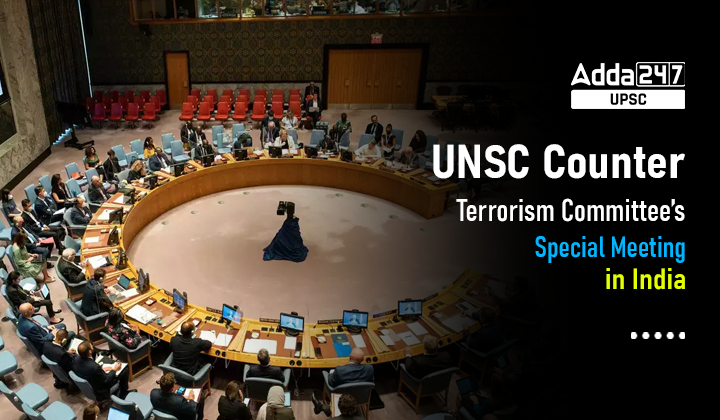Table of Contents
UNSC Counter-Terrorism Committee: Relevance For UPSC
GS 2: Important International Institutions, Groupings & Agreements Involving India and/or Affecting India’s Interests; Effect of Policies & Politics of Countries on India’s Interests.
UNSC Counter-Terrorism Committee: Why in news?
- For the first time since 2015, the United Nations Security Council Counter-Terrorism Committee will hold a special meeting away from Headquarters, in Mumbai and New Delhi, India, on 28 and 29 October.
- The meeting will focus on Unmanned Aerial Vehicles (UAVs) and other emerging technologies.
UNSC Counter-Terrorism Committee: What are the objectives?
- Mindful of the increasing threat posed by the misuse of these technologies, the objectives are to:
- (i) provide an overview of ways Member States are deploying new and emerging technological developments to prevent and counter terrorist narratives and acts and to bring terrorists to justice, consistent with their human rights obligations;
- (ii) update Member States on recent developments and the latest evidence-based research on threats;
- (iii) identify continuing challenges; and
- (iv) share good practices in compliance with international human rights law, industry action, public-private partnerships and legislative, policy and regulatory responses.
UNSC Counter-Terrorism Committee: Which are the key focus areas?
- The special meeting will focus on three areas – Internet and social media; terrorism financing; and unmanned aerial systems (UAS) – where emerging technologies are experiencing rapid development, growing use by Member States (including for security and counter-terrorism purposes), and increasing threats of abuse for terrorist purposes.
- The Counter-Terrorism Committee is assisted by its Executive Directorate (CTED), which led a series of six technical sessions, held 16 Sept. to 3 Oct., to inform the special meeting and its outcome document.
UNSC Counter-Terrorism Committee: How UNSC Counter-Terrorism Committee formed?
- Countering the scourge of terrorism has been on the agenda of the United Nations for decades.
- In the aftermath of the 11 September attacks against the United States in 2001, the Security Council unanimously adopted resolution 1373 (2001), which for the first time established a dedicated Counter-Terrorism Committee (CTC) of the Council.
- The CTC is assisted by an Executive Directorate (CTED), which carries out its policy decisions and conducts expert assessments of the 193 United Nations Member States.
UNSC Counter-Terrorism Committee: Members of the UNSC Counter-Terrorism Committee (CTC)
The Committee is composed of 15 Member States:
- Albania
- Brazil
- China
- France
- Gabon
- Ghana
- India
- Ireland
- Kenya
- Mexico
- Norway
- Russian Federation
- United Arab Emirates
- United Kingdom
- United States
UNSC Counter-Terrorism Committee: Country Visits
- CTED conducts country visits on the Counter-Terrorism Committee’s behalf to assess Member States’ counter-terrorism efforts, including progress made, remaining shortfalls, and priority areas for technical assistance needs, as well as to identify terrorism-related trends and challenges and good practices employed in the implementation of relevant Security Council resolutions.
- CTED’s visits to Member States, conducted on the Committee’s behalf, is the primary tool to be used by the CTC to effectively fulfil its mandate to monitor, promote and facilitate Member States’ implementation of Security Council resolutions.
Know About UNSC
|



 TSPSC Group 1 Question Paper 2024, Downl...
TSPSC Group 1 Question Paper 2024, Downl...
 TSPSC Group 1 Answer key 2024 Out, Downl...
TSPSC Group 1 Answer key 2024 Out, Downl...
 UPSC Prelims 2024 Question Paper, Downlo...
UPSC Prelims 2024 Question Paper, Downlo...





